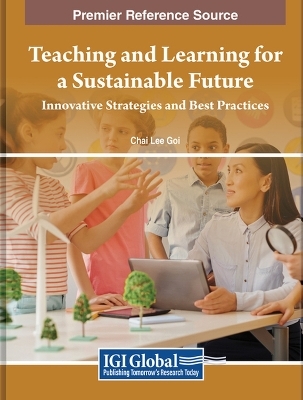
Teaching and Learning for a Sustainable Future
Innovative Strategies and Best Practices
Seiten
2024
IGI Global (Verlag)
978-1-6684-9859-0 (ISBN)
IGI Global (Verlag)
978-1-6684-9859-0 (ISBN)
Delves into the critical global challenges of sustainability and the indispensable role of education in forging a sustainable future for generations to come. This interdisciplinary and multi-sectoral volume embraces themes ranging from climate change and biodiversity loss to social justice, poverty reduction, and sustainable development.
Teaching and Learning for a Sustainable Future: Innovative Strategies and Best Practices delves into the critical global challenges of sustainability and the indispensable role of education in forging a sustainable future for generations to come. This interdisciplinary and multi-sectoral endeavor embraces themes ranging from climate change and biodiversity loss to social justice, poverty reduction, and sustainable development. By integrating environmental, social, and economic dimensions, the book offers a holistic approach to teaching and learning for sustainability, presenting innovative strategies and best practices that can be adapted across diverse disciplines, levels of education, and contexts. Drawing upon a rich tapestry of pedagogical approaches, the book illuminates experiential learning, inquiry-based learning, problem-based learning, and project-based learning as powerful tools for addressing sustainability challenges and opportunities. Additionally, it showcases cutting-edge teaching tools and technologies, including online platforms, social media, virtual and augmented reality, and gamification, revolutionizing the dissemination of sustainability education. The book takes this research a step further by examining how to effectively integrate sustainability into curricula across different educational levels, from primary and secondary education to tertiary and professional settings. It emphasizes the significance of cross-disciplinary collaborations and partnerships, fostering community-based learning, industry alliances, and international cooperation, thus enriching the global discourse on sustainability education. Central to the book's purpose is inspiring educators to embrace sustainable practices within their teachings and equipping learners with the knowledge, skills, and values vital for embracing a sustainable future. The book also serves as a platform for educators, academics, researchers, policy makers, and students to share experiences, insights, and best practices, propelling the evolution of sustainability education.
Teaching and Learning for a Sustainable Future: Innovative Strategies and Best Practices delves into the critical global challenges of sustainability and the indispensable role of education in forging a sustainable future for generations to come. This interdisciplinary and multi-sectoral endeavor embraces themes ranging from climate change and biodiversity loss to social justice, poverty reduction, and sustainable development. By integrating environmental, social, and economic dimensions, the book offers a holistic approach to teaching and learning for sustainability, presenting innovative strategies and best practices that can be adapted across diverse disciplines, levels of education, and contexts. Drawing upon a rich tapestry of pedagogical approaches, the book illuminates experiential learning, inquiry-based learning, problem-based learning, and project-based learning as powerful tools for addressing sustainability challenges and opportunities. Additionally, it showcases cutting-edge teaching tools and technologies, including online platforms, social media, virtual and augmented reality, and gamification, revolutionizing the dissemination of sustainability education. The book takes this research a step further by examining how to effectively integrate sustainability into curricula across different educational levels, from primary and secondary education to tertiary and professional settings. It emphasizes the significance of cross-disciplinary collaborations and partnerships, fostering community-based learning, industry alliances, and international cooperation, thus enriching the global discourse on sustainability education. Central to the book's purpose is inspiring educators to embrace sustainable practices within their teachings and equipping learners with the knowledge, skills, and values vital for embracing a sustainable future. The book also serves as a platform for educators, academics, researchers, policy makers, and students to share experiences, insights, and best practices, propelling the evolution of sustainability education.
Chai Lee Goi is Associate Professor at the Department of Management, Marketing & Digital Business, Faculty of Business, Curtin University, Malaysia. His research interests include consumer behaviour, Internet marketing, sustainable development, big data and educational technology.
| Erscheinungsdatum | 17.02.2024 |
|---|---|
| Verlagsort | Hershey |
| Sprache | englisch |
| Maße | 216 x 279 mm |
| Gewicht | 272 g |
| Themenwelt | Sozialwissenschaften ► Pädagogik ► Allgemeines / Lexika |
| Sozialwissenschaften ► Pädagogik ► Bildungstheorie | |
| Wirtschaft ► Betriebswirtschaft / Management | |
| Wirtschaft ► Volkswirtschaftslehre | |
| ISBN-10 | 1-6684-9859-6 / 1668498596 |
| ISBN-13 | 978-1-6684-9859-0 / 9781668498590 |
| Zustand | Neuware |
| Haben Sie eine Frage zum Produkt? |
Mehr entdecken
aus dem Bereich
aus dem Bereich
Eine neues Menschsein für die Welt von morgen
Buch | Softcover (2023)
Vahlen (Verlag)
CHF 34,85
Einführung in die Theorie transformatorischer Bildungsprozesse
Buch | Softcover (2023)
Kohlhammer (Verlag)
CHF 47,60


